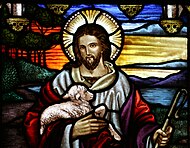Mungu Mwana
Mandhari

Mungu Mwana (kwa Kigiriki Θεός ὁ υἱός, Theos o uios) ni nafsi ya pili ya Utatu Mtakatifu wa Mungu pekee.
Dogma hiyo ya Ukristo (madhehebu yote isipokuwa Wasiosadiki Utatu) inamkiri Yesu kuwa Mungu sawa na Mungu Baba na Roho Mtakatifu.
Kanuni ya Imani ya Nisea-Konstantinopoli inamkiri Mungu Mwana "aliyezaliwa na Baba tangu milele yote", alikuwepo kabla ya kujifanya binadamu tumboni mwa Bikira Maria.[1] [2][3] [4]
Tanbihi
[hariri | hariri chanzo]- ↑ F. Donald Logan A history of the church in the Middle Ages Page 10 2002 "It was later to be summed up in the Athanasian Creed: Ita deus pater, deus filius, deus spiritus sanctus, Et tamen non tres dii, sed unus est deus. (Thus, God the Father, God the Son, God the Holy Spirit, Yet not three gods but one God."
- ↑ Luigi Gioia The theological epistemology of Augustine's De Trinitate 2008 "... the obedience of Christ on the cross is the obedience of God the Son to God the Father: 'what greater example of obedience' ... exemplum qui per inobedientiam perieramus quam deo patri deus filius obediens usque ad mortem crucis?"
- ↑ MacMullen translation 1888 http://www.newadvent.org/fathers/160390.htm
- ↑ The Augsburg Confession: a commentary Leif Grane, John H. Rasmussen – 1987 "GT: "Dass Gott der Sohn sei Mensch worden, geborn aus der reinen Jungfrauen Maria" (that God the Son became man, born of the virgin Mary)."
Viungo vya nje
[hariri | hariri chanzo]- Catholic Encyclopedia: The Blessed Trinity
- The Jewish Encyclopedia: Son of God—by Kaufmann Kohler, Emil G. Hirsch
- Jesus' Divinity—by christians.eu
| Makala hii kuhusu dini ya Ukristo bado ni mbegu. Je, unajua kitu kuhusu Mungu Mwana kama historia yake, matokeo au athari zake? Labda unaona habari katika Wikipedia ya Kiingereza au lugha nyingine zinazofaa kutafsiriwa? Basi unaweza kuisaidia Wikipedia kwa kuihariri na kuongeza habari. |
